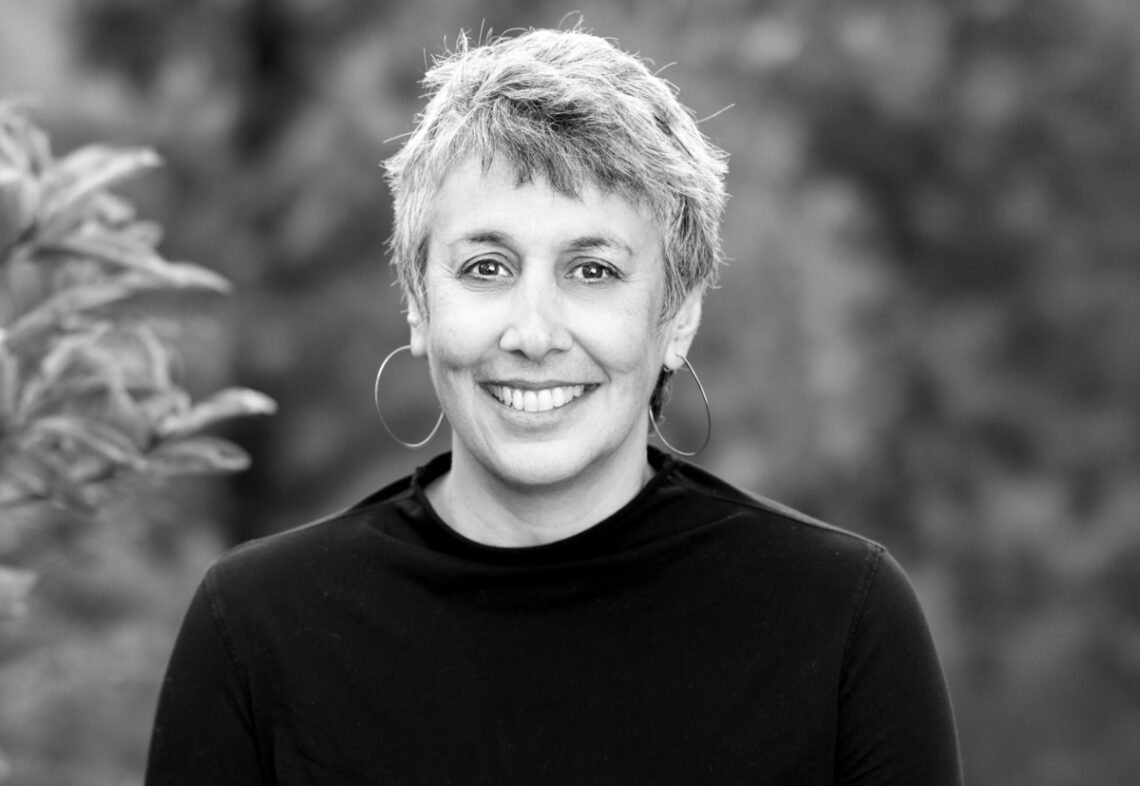
Geeta Anand. Photo by Christopher Michel.
Pulitzer-Prize winning journalist Geeta Anand has decided to return to full-time teaching and writing after what’s been called a transformational term as dean of UC Berkeley’s Graduate School of Journalism, in which the school raised millions of dollars, including the largest philanthropic pledge in its history, doubled financial aid for incoming students and created the biggest state-funded program for local news in the country.
“Geeta Anand has been a visionary and transformative leader for the School of Journalism,” said Carol T. Christ, who served as chancellor of the University of California, Berkeley, until retiring this summer.
Anand is the first woman of color and first woman to lead the school in its 56-year history. Her five-year term as dean ends next summer.
Anand, who spent two decades as a reporter at the Wall Street Journal, New York Times and Boston Globe, says she was “an accidental dean” who was asked to step into leadership roles shortly after taking a position as a professor at Berkeley Journalism. In 2019, she was tapped to serve as director of the school’s Investigative Reporting Program, and in 2020, Professor Ed Wasserman, who was dean at that time, along with faculty members and university officials asked Anand to be interim dean. Shortly thereafter she became the school’s permanent dean.
The school has raised $50 million in gifts, pledges and public funding during the first four years of Anand’s tenure. These funds support world-class journalism, student scholarships, internship stipends and fellowships to early-career journalists.
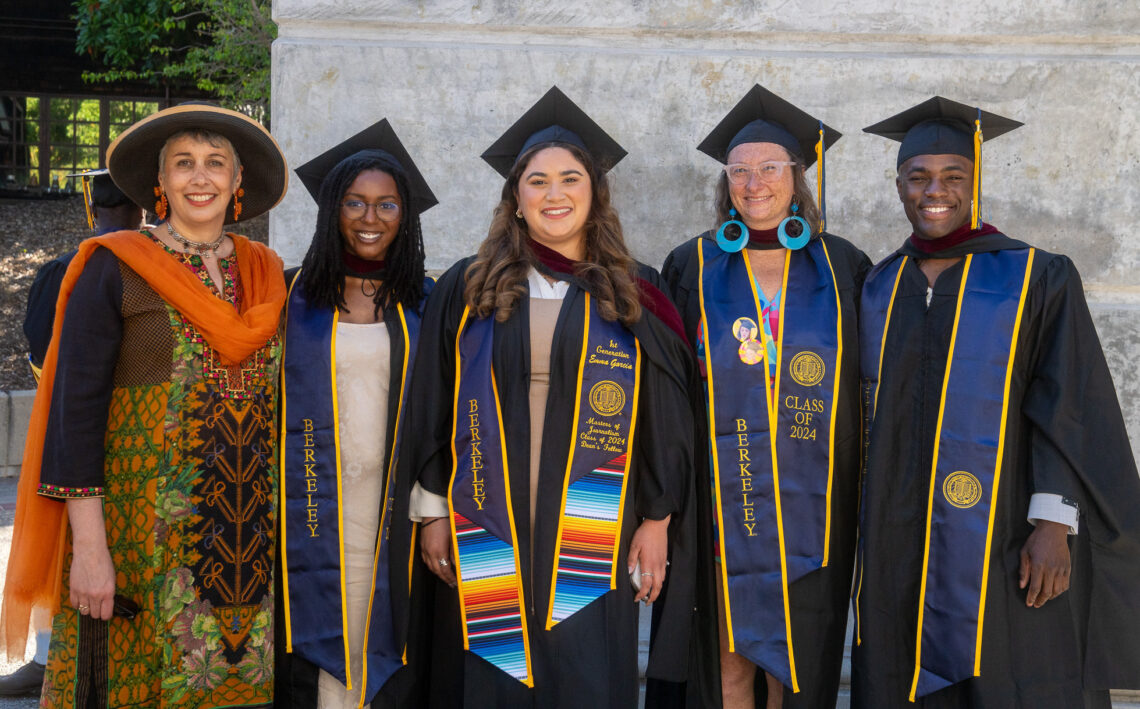
Geeta Anand and the second cohort of first generation Dean’s Fellows in 2024.
Anand has led the school through the pandemic, the racial reckoning after George Floyd’s murder and a time of advancing pressures on the field of journalism, with layoffs and newsroom closures, changes in technology and a rise in mis- and disinformation.
Former Chancellor Christ said Anand is a leader gifted in “seeing challenges as opportunities.”
It was the challenges, Anand reflected, which made the deanship “seem like an opportunity to make an impact at a critical time.”
Faculty, campus and journalism leaders expressed appreciation for Anand’s service, contributions and elevation of the program.
“She will do in five years what most people don’t do in ten,” said Emeritus Professor Lydia Chávez, founder of the Mission Local news site, incubated at Berkeley Journalism. “She makes you want to be part of something that’s bigger — bigger than Geeta or yourself or any one student. She’s going to be really, really missed.”
Chávez said “it’s extraordinary to think of all she’s done,” from raising significant support for student scholarships to reviving the international reporting program to being a role model.
“Her idea that the way you change journalism is to change the people who practice it is inspiring,” said David Corvo, former senior executive producer at NBC and a longtime advisory board member who has collaborated with several journalism school deans. “She was very committed to expanding the pool of people from which the next generation of journalists will emerge. I’m all in on that.”
Raney Aronson-Rath, executive producer and editor-in-chief of PBS’s flagship documentary series “Frontline,” said that it was Anand, at the start of her deanship, who kicked off a “transformational” conversation among deans at all major journalism schools about making journalism education accessible.
Aronson-Rath, whose team recently won an Academy Award for “20 Days in Mariupol,” said the focus on equity in access at journalism schools has helped create a “healthier journalism ecosystem,” in which employers can hire excellent journalists from diverse backgrounds — to ensure that all stories are told.
Anand said she tried to put the strengths she developed as a journalist to good use as an academic leader — such as courage, deep listening, clear communication and the ability to move quickly. Her effectiveness was elevated exponentially by her partnership with Associate Dean Jeremy Rue, whose more than a decade of teaching and administrative experience compensated for her newness to academia.
Anand’s deanship coincided with the pandemic. During the first days of COVID-19, she led an effort, together with Investigative Reporting Program Chair David Barstow, to turn Berkeley Journalism within one week into a working newsroom where students reported stories for The New York Times, Los Angeles Times, San Francisco Chronicle and other leading publications. Half of the school’s students were published in The Times. “When I saw what could be done in a week, I was like ‘Imagine what could be possible longer term at a university like ours,’” Anand said.
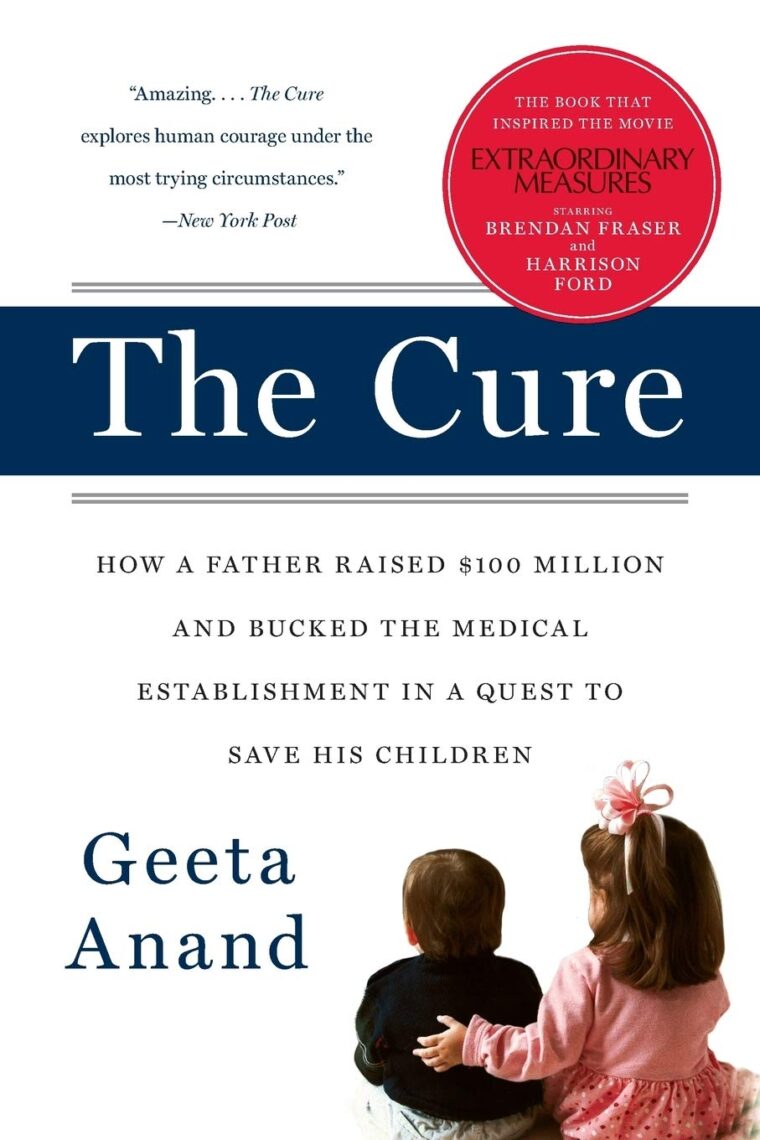
Anand’s non-fiction book, The Cure, was made into the Harrison Ford movie “Extraordinary Measures” in 2010.
Anand also responded to a national movement for racial justice, following the murder of George Floyd. She convened multiple working groups of faculty, staff and alumni that came up with a robust anti-racism plan and initiative to “change the face of journalism.” Anand recently embedded the anti-racism plan into the school’s strategic plan to ensure that the work is carried out through every school program.
In efforts to make the promise of diversity, equity, inclusion and belonging real at Berkeley Journalism, Anand and the school’s advancement team, led by Assistant Dean Steve Katz, raised significant funds for fellowships and other student services. This year, Angela Filo (’99) and her husband David Filo, co-founder of Yahoo, pledged $10 million over the next five years — the single largest philanthropic pledge in the school’s history. The support from the Filos and other generous donors has enabled the school to double its financial aid this year, which led to more top candidates accepting offers. The school is on an ambitious path toward “debt free” education for all — an approach that emphasizes equity by meeting the overall financial needs of students beyond tuition.
Under Anand’s leadership, the faculty grew from 9 to 13 members, representing a 44 percent increase.
“I’m sure that people went to teach at Berkeley because you had a very dynamic woman of color at the school,” said Chávez. “And that’s going to be a very hard act to follow. She wasn’t a dean locked up in her office. She was a dean out and about and really interacting with everyone on the faculty and being inclusive.”
The number and diversity of applicants to Berkeley Journalism also increased under Anand’s leadership. This year, 40 percent of domestic students in the incoming class are first-generation college students and nearly half are from California. Sixty-seven percent of the incoming class identify as students of color.
Anand said she sought to raise significant funds for student fellowships in order for all students to have access to a Berkeley Journalism education — for tuition as well as summer internships — so that it’s not just the privileged who are able to become journalists.
“Under her leadership, the school has brought in a record-breaking level of resources, most of which has been funneled right back to students. The school now funds more student tuition scholarships than any time in its history,” said Rue, the associate dean.
Anand’s tenure has also been marked by leveraging the expertise of the Berkeley campus to report on urgent global matters. She worked with Rausser College of Natural Resources Dean David Ackerly and new Berkeley Journalism Knight Chair Jason Spingarn-Koff to launch the Berkeley Climate Journalism Lab. Anand also worked with Dean Ann Harrison at Haas School of Business to launch a new Business Journalism program.
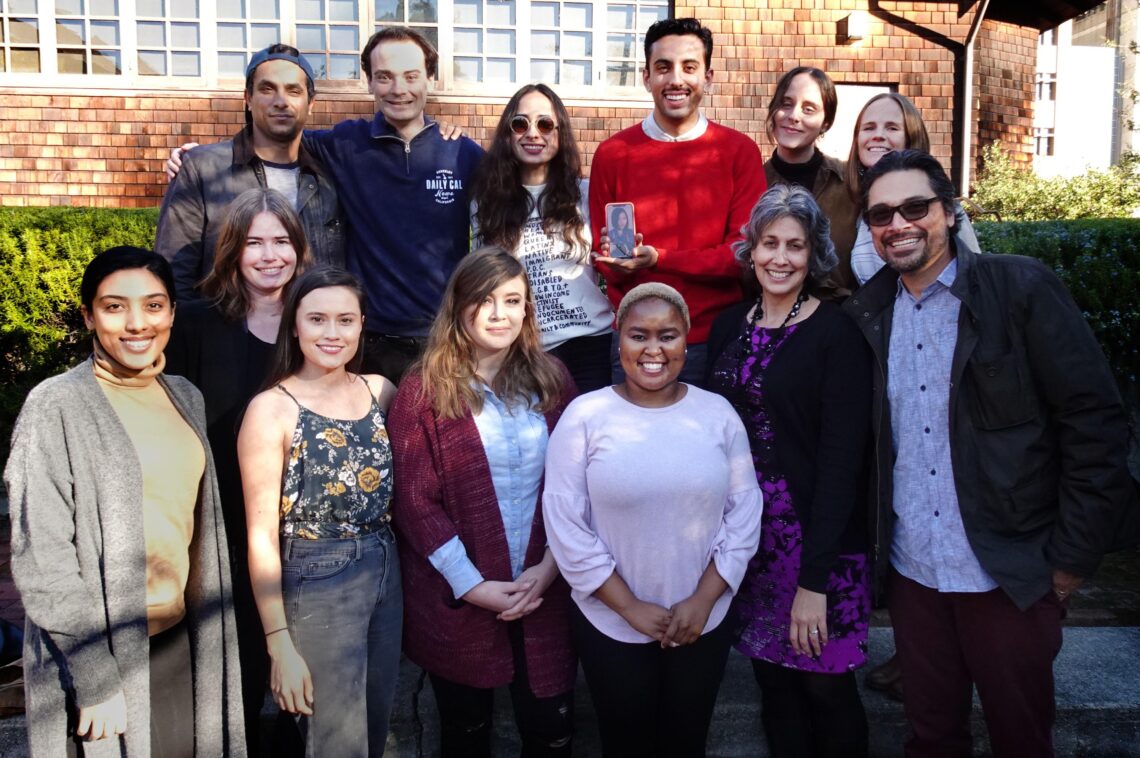
Geeta Anand and her first J200 Introduction to Reporting Class, co-taught with Professor Richard Koci Hernandez in the fall of 2018.
Berkeley Law Dean Erwin Chemerinsky said Anand is a leader among the deans on campus. “She is one of the most thoughtful and wise people I have ever met,” Chemerinsky said. “Although she will be greatly missed as a dean, the campus is so fortunate that she will be a professor in the School of Journalism for years to come.”
Corvo said Anand re-established the importance of the school on the Berkeley campus.
“It’s the smallest school on the campus and so it needs to be loud so that people understand its value, and I think she did a good job on that front…weaving Berkeley Journalism into the fabric of the campus,” Corvo said.
In recognition of massive challenges to journalism nationwide, Anand prioritized work to support local news. With California State Senator Steve Glazer, she created the California Local News Fellowship Program — the largest state-funded fellowship program for local news in the country. With $25 million in support from the state of California, the program, led by fellowship director Christa Scharfenberg, will have 75 local news fellows working in newsrooms statewide in what’s proving to be a model for the nation.
She’s also championed efforts to make Berkeley Journalism more accessible to those outside of the Bay Area by bringing the undergraduate minor and courses for professionals online. A $1 million gift from Anne and Susan Wojcicki in honor of their mother, Esther Wojcicki, launched the Wojcicki Online Journalism Program this year.
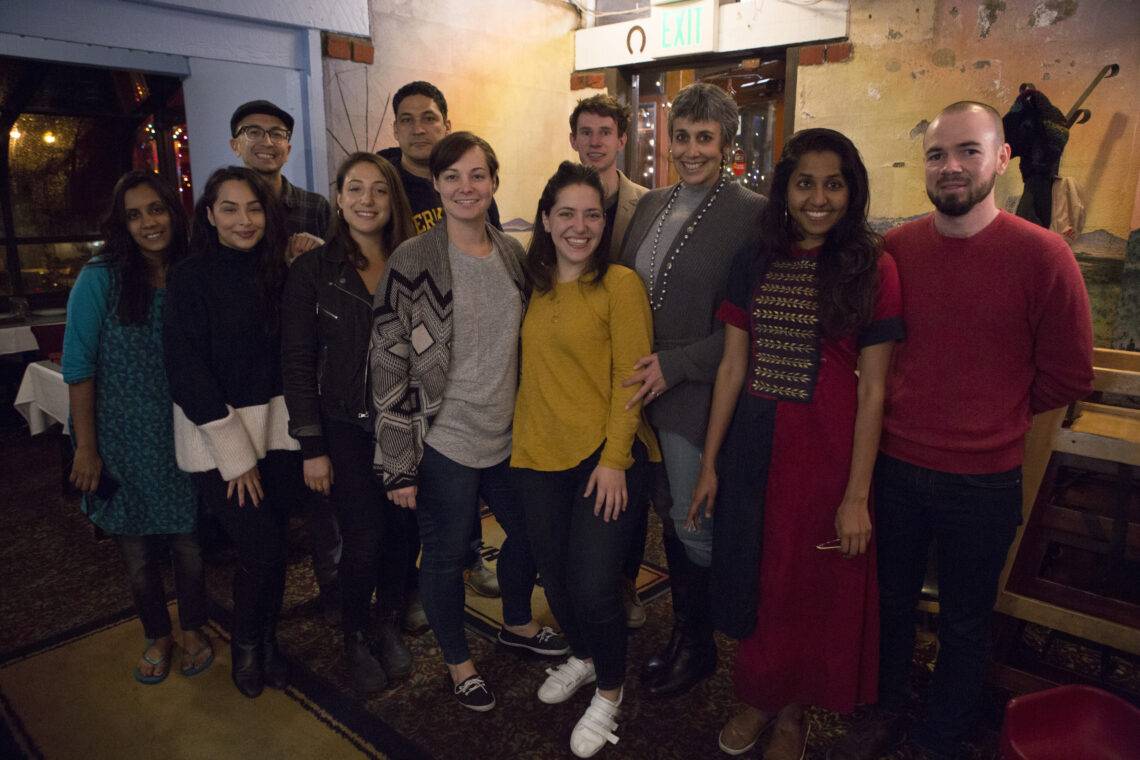
Geeta Anand with her India Reporting Class in spring 2018, which was the first class she ever taught at Berkeley Journalism.
During her deanship, she has been honored with three leadership awards: the Dow Jones Richard J. Levine Journalism Champion Award, SPJ NorCal’s Distinguished Service to Journalism Award and Chang-Lin Tien Leadership in Education Award.
Professor Bill Drummond has worked with eight Berkeley Journalism deans during his career at the school. He’s seen dramatic changes in the leadership role over time, including massive shifts in campus needs and expectations about fundraising. While Drummond applauds Anand for her fundraising successes, he said she brings other gifts to the table.
“She’s very warm and just a wonderful person to spend time with,” he said. “She is much more of a communicator. She’s not an imperial dean or a CEO-type dean. That’s made a difference in the overall ecosystem and environment of the journalism school.”
Drummond said he has never met more regularly with a dean than Anand. She held weekly town halls, office hours and meditation sessions for years, in addition to hosting monthly faculty mixers and student affinity group dinners at her house.
“The thing that Geeta has done to her great, great, credit is to calm things down,” Drummond said. “She deserves all of the credit for just keeping us on course during a very turbulent time.”
The search for a new dean will be led by the Executive Vice Chancellor and Provost Ben Hermalin’s office in concert with a national search firm. In the coming weeks, students, faculty and staff will be invited to serve on a search and hiring committee.
Anand will continue to advance multiple initiatives and contribute to fundraising throughout the year. After that, she plans to return to her role as a professor at the school, teaching, writing books and supporting the next dean in continuing to build impactful programs.
“Serving as dean at Berkeley Journalism has been the greatest professional experience of my life,” Anand said. “I’m grateful to be part of an extraordinary community at Berkeley and beyond that believes in the power and importance of excellent journalism to the future of our world.”
###
Media Contact
Andrea Lampros at alampros@berkeley.edu or 510.847.4469.
